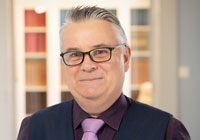
Photo credits:
Mikael Wallerstedt
Bruce Buchan
Fellow, SCAS.
Professor of History, School of Humanities, Languages, and Social Science, Griffith University
Bruce Buchan is Professor of History in the School of Humanities, Languages, and Social Science at
Griffith University, Australia. He is an intellectual historian whose work traces the histories of European
ideas through the experience of empire and colonisation since the early modern period, with a particular
focus on the era of Scotland’s Enlightenment. A guiding thread in Buchan’s research is to seek
an under-
standing of concepts by bringing different fields of historical enquiry into productive conversation, most
notably colonial history, histories of sound and noise, the history of science and medicine, and the history
of political and social thought. Buchan’s publications include: Empire of Political Thought: Indigenous
Australians and the Language of Colonial Government (2008), An Intellectual History of Political Cor-
ruption (with Lisa Hill, 2014), and the co-edited volumes Sound, Space and Civility in the British World,
1700-1850 (2019), and Piracy in World History (2021), which is available in open access.
For the last
ten years, Buchan has collaborated with Associate Professor Linda Andersson Burnett (Upp-
sala)
on a
project that reconceptualises the early history of the concept of race in Scottish Enlightenment
thought,
and analyses its circulation through a variety of global and colonial settings. This research has
been widely
published in the Modern Intellectual History, History of the Human Sciences, Intellectual
History Review,
Global Intellectual History, the Journal of the History of Ideas, and will culminate in a
jointly authored
monograph Racing Humanity: Education, Empire and Ethnography in Scotland’s Global
Enlightenment,
c. 1770-1820 (Yale University Press).
While a resident fellow at SCAS, Buchan will be researching on how
ideas of race framed the con-
ceptualisation of historical time in Scottish Enlightenment thought.
Bruce Buchan is in residence in the spring of 2024.
This information is accurate as of the academic year 2023-24.






